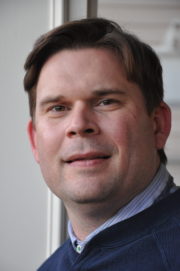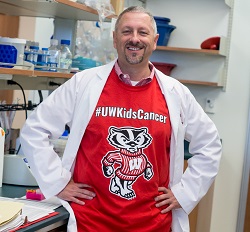September 5, 2016:
The fight against cancer is ramping up like never before, and raising awareness is a key part of the strategy to defeat cancer. September is an action-packed month of awareness for the following cancers: thyroid, ovarian, prostate, gynecologic, childhood, and leukemia/lymphoma. There is much to be done, and member institutions of the Big Ten Cancer Research Consortium are leading the charge, from a first-of-its-kind clinical trial, to a unique survivorship program, to securing a prestigious grant.
Ovarian Cancer Awareness
A Michigan State University College of Human Medicine researcher’s commitment to fighting ovarian cancer, the most deadly of the female reproductive system, has received a boost in the form of a highly prestigious grant.

Ronald Chandler, PhD
Ronald Chandler, PhD, an assistant professor in the Department of Obstetrics, Gynecology & Reproductive Biology, recently won a grant from the Mary Kay Foundation to continue his research into the causes of ovarian cancer.
Richard Leach, MD, chair of the college’s Department of Obstetrics, Gynecology & Reproductive Biology, called the grant “prestigious and very competitive.”
As with most cancers, ovarian cancer is a complex disease that arises from mutations and other triggers in normal cells. For the next two years, the Mary Kay grant will allow Chandler to study two signaling pathways in ovarian cells that, when they go awry, appear to prompt normal cells to become cancerous.
“We think that both pathways have to be affected either through mutation or some other perturbation,” such as inflammation, for ovarian cancer to form, Chandler said.
Understanding how the two pathways interact could lead to precision treatments for ovarian cancer, Chandler said.
“If you have that prior knowledge that they work in concert, then you can design a therapy for women whose ovarian cancer has a particular set of mutations,” he said. “That is the direction medicine is moving.”
Ovarian cancer accounts for about three percent of all cancers for women, but it causes more deaths than any other cancer of the female reproductive system, according to the American Cancer Society. About 22,280 women in this country will be diagnosed with ovarian cancer this year, the Society estimated, and about 14,240 women will die from the disease.
“It’s a very serious disease, and I felt like I could do a lot of good there.” Chandler said.
Pediatric Cancer Therapies From Bench to Bedside

Mario Otto, MD, PhD, is working to bring new therapies for pediatric cancers from bench to bedside.
Cancer therapy always moves toward a common goal: Aggressively targeting harmful cells while sparing the normal cells, and curing the patient without immediate or lasting side effects. Reducing side effects is perhaps even more important in pediatric cancers because a child’s healthy cells, like cancer cells, are actively growing. And a child who beats cancer is more likely to live longer as a survivor than an adult survivor.
Mario Otto, MD, PhD, is a pediatric oncologist at the UW Carbone Cancer Center and American Family Children’s Hospital who treats patients as a physician, providing the most effective, least toxic therapies he currently can. But he is also a researcher who develops and tests new therapies for pediatric cancers in the lab and looks to move them from bench to bedside.
For example, Otto is leading a first-of-its-kind clinical trial based on technology that he developed as a postdoctoral fellow. The trial provides childhood cancer patients with life-saving stem cell transplants in a way that restores their full immune system more quickly, helping boost their ability to fight both cancer and infections and resulting in reduced hospitalization times.
Now with his own lab at UW, his research group is developing what he hopes will translate into the next clinical trials and eventual standard therapies for childhood cancers.
“One of the biggest challenges in cancer research is having a good pre-clinical model where you can test in the lab what you would like to later evaluate in patients,” Otto said. “What we see in mice is not always what is seen in humans, so we need to develop more reliable models.”
The Otto Lab is developing humanized mouse models, meaning they provide human blood stem cells and immune cells to mice that have been genetically engineered to lack their own immune system. Then, they give the mice cells from human cancer cell lines such that the mice develop cancer.
“We want to develop this humanized mouse that carries a human tumor and use this model as a platform to study any type of immunotherapy,” Otto said. “We can then pre-clinically evaluate how to influence the immune system to recognize cancers, and we can study how to combine immunotherapies with existing chemotherapies and other cancer treatments.”
Childhood Cancer Survivorship Program
The Robert H. Lurie Comprehensive Cancer Center of Northwestern University has a robust survivorship program for adult survivors of childhood cancer.
The STAR survivorship program (Survivors Taking Action & Responsibility) is a comprehensive long-term follow-up program for adult survivors of pediatric cancer. The STAR Program follows survivors through adulthood focusing on their special medical and psychological needs. Services are provided in a clinical setting with an emphasis on patient care, education, and research. The program is directed by Aarati Didwania MD, and coordinated by Karen Kinahan, DNP, APN, FNP-BC, who has expertise in pediatric oncology and the effects of treatment from childhood cancer.
They created a educational video series for adult survivors of childhood cancer and their families called GET EMPOWERED, which is available free of charge through the Lurie Cancer Center website.
Learn more about this program.
You Can Join the Fight Against Cancer
![]() Did you know you can directly support the team efforts of the Big Ten Cancer Research Consortium? Make a gift today!
Did you know you can directly support the team efforts of the Big Ten Cancer Research Consortium? Make a gift today!
This story was compiled by Alecia Burkhardt, communications associate for the Big Ten Cancer Research Consortium, with contributions from Michigan State University College of Human Medicine, the University of Wisconsin Carbone Cancer Center, and the Robert H. Lurie Comprehensive Cancer Center.
About the Big Ten Cancer Research Consortium: The Big Ten Cancer Research Consortium was created in 2013 to transform the conduct of cancer research through collaborative, hypothesis-driven, highly translational oncology trials that leverage the scientific and clinical expertise of Big Ten universities. The goal of the Big Ten Cancer Research Consortium is to create a unique team-research culture to drive science rapidly from ideas to new approaches to cancer treatment. Within this innovative environment, today’s research leaders collaborate with and mentor the research leaders of tomorrow with the unified goal of improving the lives of all patients with cancer.
About the Big Ten Conference: The Big Ten Conference is an association of world-class universities whose member institutions share a common mission of research, graduate, professional and undergraduate teaching and public service. Founded in 1896, the Big Ten has sustained a comprehensive set of shared practices and policies that enforce the priority of academics in the lives of students competing in intercollegiate athletics and emphasize the values of integrity, fairness and competitiveness. The broad-based programs of the 14 Big Ten institutions will provide over $200 million in direct financial support to almost 9,500 students for more than 11,000 participation opportunities on 350 teams in 42 different sports. The Big Ten sponsors 28 official conference sports, 14 for men and 14 for women, including the addition of men’s ice hockey and men’s and women’s lacrosse since 2013. For more information, visit www.bigten.org.
















Subscribe to the Big Ten CRC Newsletter X
X Facebook
Facebook YouTube
YouTube